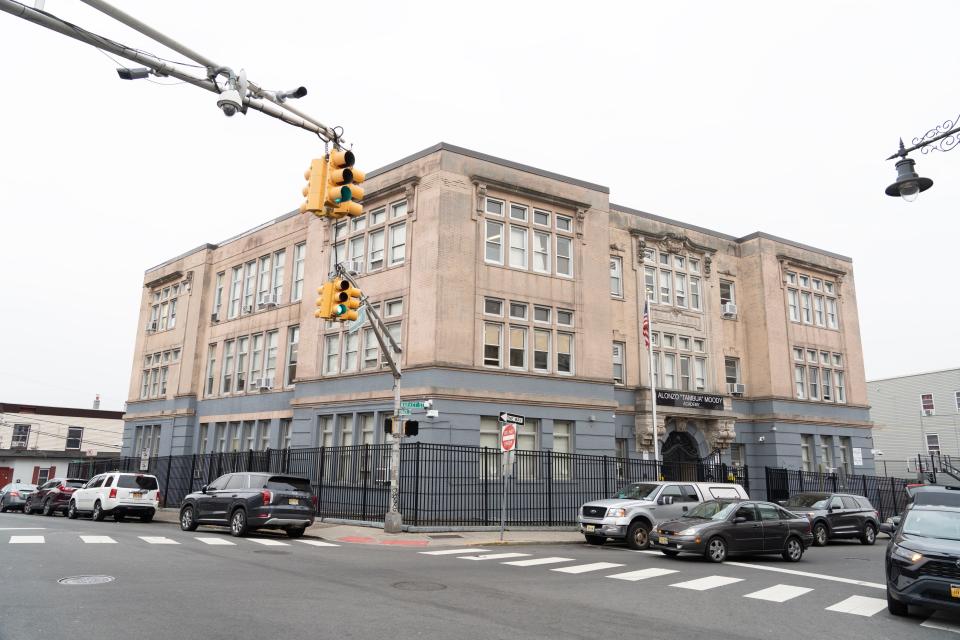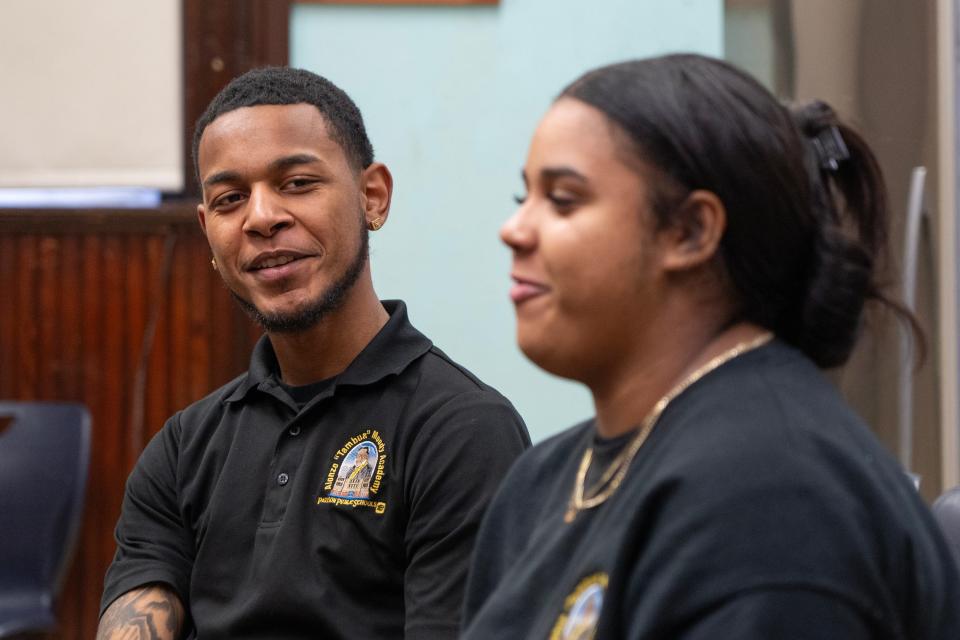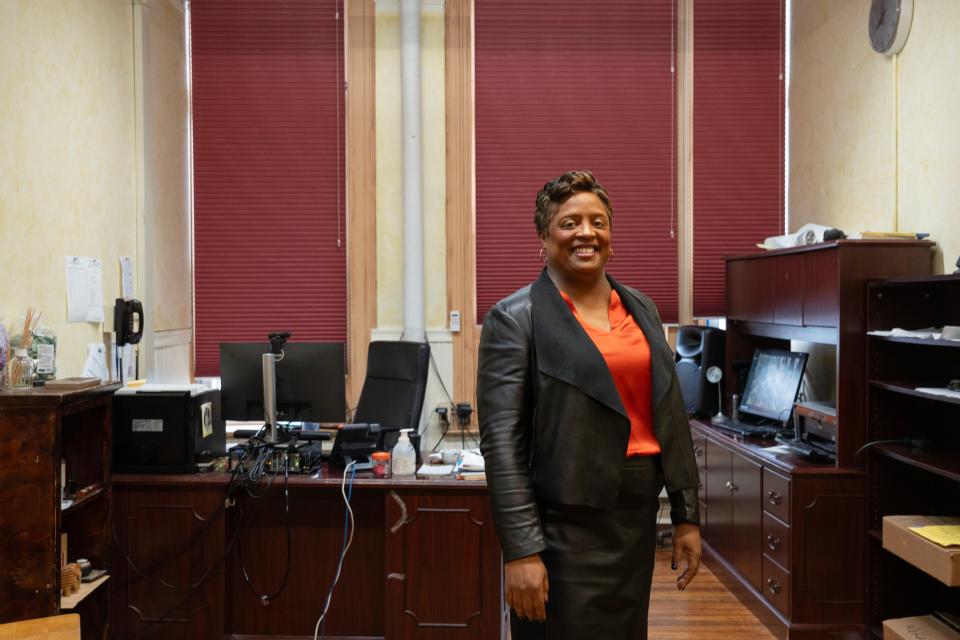Can school gardens help disaffected teens? Yes, says this Paterson school
It takes a village to raise a child, goes the adage.
Add a garden, says the U.S. Department of Agriculture.
The garden at Alonzo "Tambua" Moody Academy in Paterson, an alternative high school for struggling teens who have left the city’s other high schools and need help transitioning back into them, is a row of seven raised beds in wood planters.
The beds are tightly wedged between the back wall of Moody Academy's 104-year-old school building and a high perimeter fence abutting a busy street in Paterson’s 5th Ward. On a recent morning, a bunch of herbs braved the wind, but the beds were mostly bare.
Story continues after photo gallery.
Over the summer, students grew tomatoes, lettuce and basil, said Amber Martinez, a Moody Academy senior. Martinez said she cooked with fellow students and they served some of their homemade pesto in school and at Eva’s Village, a community shelter and kitchen.
“Sometimes after school it's like one big bonding experience,” said Martinez, whose guidance counselor referred her to Moody Academy because she was missing classes at her previous high school, Eastside High in Paterson.
But the mechanics of making even a small garden grow can be a challenge — and in this case it is reliant on a number of organizations.
Farm to School grant program
The garden has been funded through a 2023 USDA Farm to School grant awarded to United Way of Passaic County. United Way is partnering with Rutgers Cooperative Extension of Passaic County to develop existing gardens or build them from scratch at Moody Academy and four other schools in Paterson.
They have $49,885 to spend. The Paterson school district will run the program through its Full Service Community School program, which creates partnerships with the community to further support Moody Academy's students.
More: Paterson's schools are decaying — and are hurting kids and staff. How can they be helped?
More: Paterson schools aim for ‘accountability’ in credit recovery graduation program
The USDA’s Food and Nutrition Service awarded $10.7 million to 103 projects across the country under the Patrick Leahy Farm to School Grant Program in 2023, an annual competitive grant award. The grant connects schools to local farmers and produce.
The program, which introduces schoolchildren to the joys of gardening, has a strong but little-known footprint in New Jersey. The state Department of Agriculture's Jersey Fresh Farm to School program connects local farmers to school districts to provide school cafeterias with locally sourced, healthy food options.

The initiative promotes school gardens and garden activities by connecting schools with funding opportunities for locally grown food.
What these programs really aim to do is change lives, starting with what kids eat and how they connect around food.
Therapeutic experiences through the garden
United Way runs a food policy council whose goal is to end hunger in Passaic County by building a culture of community and school gardens, said Mary Celis, president of the organization's county chapter.
But the mental health component of gardening as a community is also driving United Way's effort. “We want to provide therapeutic experiences that could have a calming effect and maybe help students to get a reset during the day,” Celis said.
Skipping school led to fights and a disciplinary hearing for senior Da'Shawn Perry. Both Martinez and Perry started high school during the COVID shutdown. Returning to school in person had its challenges, they said.

“I was skipping. I don't know. I'm not going to blame it on COVID, it was just me making my decisions, getting into altercations,” Perry said. He said he recalls visiting the garden in summer with a teacher. But it’s the field trips the school organizes that he loves most.
He has all the credits he needs to graduate now, he said, and wants to work in a nursing home. “I like being around old people … they remind me of my grandma,” he said with a laugh.
Helping disaffected and disruptive teens
Originally called Great Falls Academy, Moody became Paterson’s only centralized public school for disaffected and disruptive teens in 2021 after reorganizations and budget cuts in the past decade that combined five alternative schools into one.
Together, those five, which included Great Falls Academy, served a similar population of around 400 students needing behavioral supports. The reorganization reduced the number of kids served; Moody Academy accepts new students every marking period and loses some who rejoin mainstream high schools.
Moody Academy usually has an enrollment of about 130 to 200 students. It provides a variety of centralized services, said Principal Nicole Payne, who took over in the summer. Payne also works as the district’s director of climate and culture, a position that requires her to assess harassment and bullying complaints and sometimes meet the children involved.
Moody’s students leave their cellphones with an administrator and have to pass through a metal detector before they can enter their classrooms in the mornings. Their bags are inspected. The cellphone policy minimizes distraction and social media access during the school day.
The small size of the school is intentional. Students get direct, individualized support, but they are also held accountable for behavior. There are only a few doors here, compared with hundreds in the district’s largest high schools, Payne said, so kids can’t sneak out easily.
Gardening and reduced crime
The school has a licensed clinical therapist, in addition to the student assistance counselors most schools keep on staff. Teenagers are referred to Moody Academy from other district schools for a variety of reasons — from disruptive behavior to low attendance to poor grades. Some have simply withdrawn from friends and teachers. Some are referred by the juvenile justice system.
The documented mental health benefits of gardening and cooking made Moody a natural choice, Celis said. “One of the things I was excited about with Moody joining the Farm to School program is that there is a mental health component to gardening. Green spaces can be integrated into social and emotional learning,” because community gardens have “a calming effect and are associated with crime reduction,” she said.
“This is a place where we don’t sequester students or put them on the side," Payne said. "Statistics show that when you’re able to trust at least one adult, you’re able to foster and move forward. That’s what we focus on. Not to say their parents are not involved or that they don’t have people in their lives, but they need an extra push.”

Amber Martinez smiled as she recalled coming late to Moody and not being allowed to enter.
“Now I have to come early. I have no other choice, but my time is getting better," she said. "They're stricter here. It's harder to escape here. It's harder to go stand in a stairwell or whatever.”
Both Martinez and Perry are glad to be at the new school.
“Once I came here, it was just like everybody was different," Perry said. "Everybody giving off, like, good energy.
"I'm cool with a few teachers in here," he said. "They just make you feel like you're part of them, instead of just pushing you away."
Food desert vs. fresh salads
At Moody, after-school clubs such as boxing, cooking and yoga, as well as summer programs, offer a sense of community and belonging to students. Moody Academy is also designated as a Full-Service Community School through another federally funded program that provides free supports and partnerships with the Police Department and local organizations, to help kids from birth through high school and after graduation.
The plans for the garden are only beginning to be hatched at meetings with the project’s many partners, and eventually with students.
“We have food deserts around here. The kids enjoy eating salads as much as they enjoy tacos,” said Payne, who hopes to have older students mentor kids in grade schools at the gardens. Another goal is someday to combine produce from all Paterson’s school gardens to sell at farmers markets in the summer.
“We hope these seeds we plant here do stream out into the kids and the community," Payne said.
This article originally appeared on NorthJersey.com: This Paterson school uses a garden to help disaffected teens

